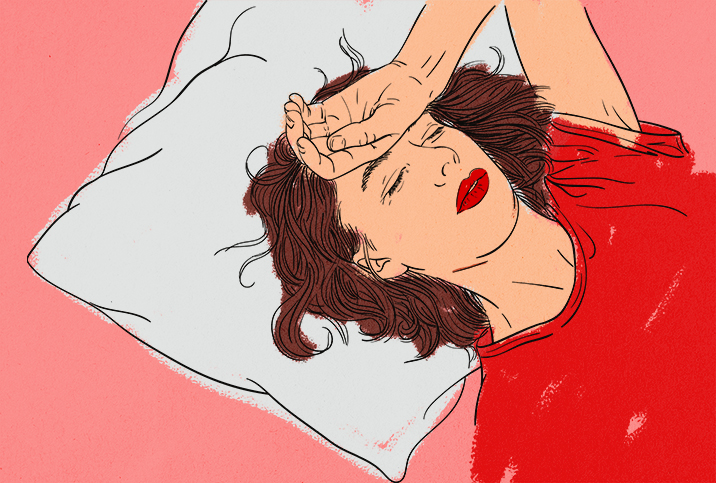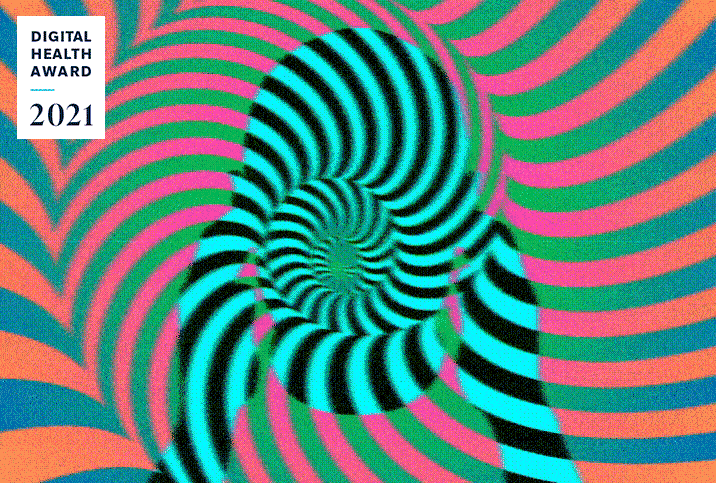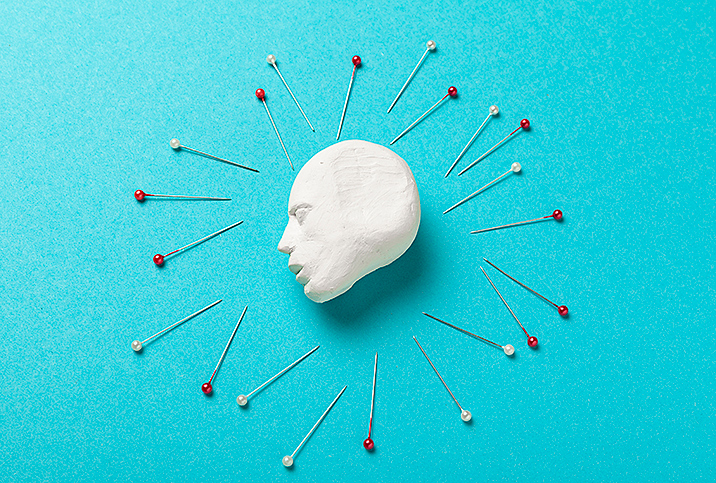Menstrual Migraines Are Experienced by More Than Half of Women

Between bloating, fatigue and PMS, the days precipitating a period can be rough enough. But for more than half of menstruating people, the usual symptoms are accompanied by migraine headaches. Known as "menstrual migraines," these attacks tend to be more severe and last longer than typical migraines and are often impervious to regular pain relief tactics, including migraine meds.
"Menstrual migraine headaches are thought to be triggered by changes in hormone levels," said Alyssa Dweck, M.S., M.D., FACOG, chief medical officer at Bonafide, and sexual health and reproductive expert for INTIMINA. "If pregnancy does not occur during the cycle, the decline of estrogen premenstrual can lead to a 'hormonal headache.'
"The hallmark of menstrual migraine is the timing," Dweck continued. "It occurs a day or two premenstrual and resolves quickly after the onset of flow."
We talked to four experts to discover what causes menstrual migraines and how to cope.
Migraines vs. headaches
A migraine is a type of headache with distinct characteristics.
"A migraine is a neurologic disease with symptoms that can include debilitating, pulsing, throbbing pain on one side of your head, nausea, vomiting [and] sensitivity to light and sounds," said Alisa Vitti, HHC, AADP, a functional nutrition and women's hormone expert and founder of FLO. "Symptoms can last a few hours or a few days."
Some, but not all, people experience an "aura" before the onset of a migraine. Auras can consist of sensory disturbances, including flashes of light, blind spots, ringing in the ears, dizziness or a tingling sensation in the hands or face, according to the Mayo Clinic. These disturbances are usually harmless, albeit jarring.
Before puberty, both sexes are equally likely to get migraines. But once a woman gets her period, she is three times more likely to experience migraines than a man, according to the National Headache Foundation. Of those with migraines, 60 percent have them right before, during or after their period. However, 90 percent have migraines at other points in their cycle. Menstrual migraines are more severe and last longer than those occurring at different times of the month.
"Migraines that happen alongside your period can often last longer, be more severe, and don't respond as well to treatment," said Samantha Wild, MRCGP, DFSRH, DRCOG, Women's Health Clinical Lead for Bupa Health Clinics. "Although there are no formal tests for menstrual migraines, it's useful to keep a migraine diary for at least three months to track your migraines in relation to your period and book a GP appointment to talk through your options."
What causes menstrual migraines?
Hormones contribute to most headaches, including those in biological men. According to the National Headache Foundation, with standard headaches, serotonin is usually the primary culprit.
However, in biological women, estrogen, and the interplay between serotonin and sex hormones, is usually to blame for migraine headaches. Specifically, according to Migraine Canada, estrogen is linked to increased serotonin production and the prevention of serotonin breakdown. So, less estrogen may mean less serotonin, a hormone with an integral role in sleep, mood and pain perception.
"Excessive decline in estradiol (a type of estrogen) during the beginning of menstruation can destabilize the brain mechanisms that have to do with pain modulation and blood vessels," said Midori Matsuo, M.D., a medical anesthesiologist/algologist and expert in pain management.
Prostaglandins, compounds that cause uterine contractions during menstruation and pregnancy, are likewise associated with menstrual symptoms, including headaches, heavy bleeding and cramping. Often, women experience fewer or no migraines during pregnancy, as estrogen levels remain high throughout. The opposite is true during perimenopause.
"When women reach menopausal age, estrogen levels fluctuate even more, which can lead to increased hormone headaches," Wild explained. "Some women find that these headaches stop once they reach menopause; however, others continue to experience them." People going through natural menopause may be less likely to experience severe symptoms than those who've had a hysterectomy.
Treatment options
If you experience menstrual migraines and take hormonal birth control, talk to your doctor about adjusting your medication or dose.
"Those on estrogen-containing birth control pills might have a higher risk of headache during the placebo days on the pill (when the pill is estrogen-free)," Dweck said. "For this reason, some with menstrual headaches will take oral contraception continuously and skip the placebo week to avoid the drop in estrogen and subsequent headache."
Doing this can lengthen the luteal phase, the time during the menstrual cycle when estrogen levels peak, and prevent significant hormone fluctuations. However, according to Dweck, this isn't an option for people who have migraines with an aura due to a slight increase in stroke risk.
'Remember, although changing hormone levels can influence headache patterns, you are not completely at the mercy of your hormones.'
Dweck also recommends avoiding common migraine triggers, including alcohol and aged cheese, and preempting headaches with pain relievers.
"While there are a lot of medication options available, some natural support is very effective, as well," Vitti said. "This includes supplementation with B vitamins, omegas, magnesium, stress management, and keeping blood sugar stable."
Caffeine may help, too. According to the National Headache Foundation, caffeine can amplify the pain-relieving effect of an over-the-counter pain reliever, such as aspirin or acetaminophen, by up to 40 percent. Just be sure to limit caffeine consumption to about 200 mg a day to avoid adverse side effects.
"Remember, although changing hormone levels can influence headache patterns, you are not completely at the mercy of your hormones," Matsuo said.


















